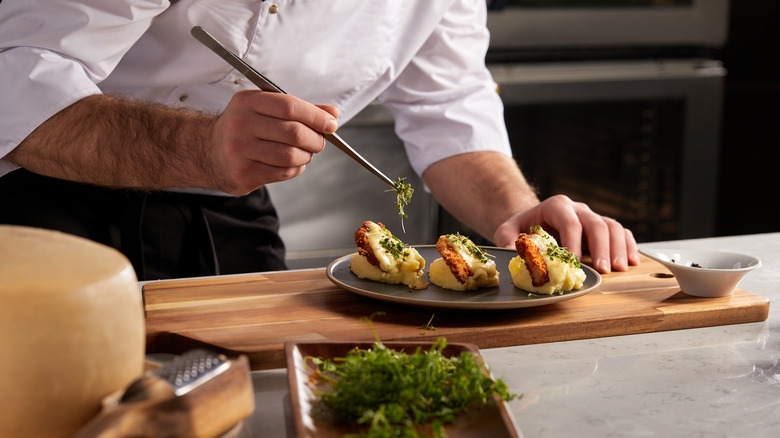What Culinary School Grads Should Know About Biden's Student Debt Plan
To get a solid return on your educational investment in culinary school, simply become a celebrity chef on the Food Network or an executive chef at a Michelin-starred restaurant upon graduation. If it were only that simple. According to Eater, many culinary school grads are saddled with debt as they enter an industry that isn't known for its impressive wages or employee benefits. But the succinct rhythm of chopping knives halted when President Biden announced his student loan forgiveness initiative and debt-ridden culinary school grads wondered if they might be included in the plan.
Attending culinary school is pricey, and Food & Wine suggests that hopeful future chefs prepare themselves to dish out roughly the same tuition as one might pay to attend a private four-year university. A year attending one of the top culinary schools in the country, like the Culinary Institute of America in Hyde Park, New York, can cost over $30,000 — and that's not including room and board or supplies like those expensive knife sets.
Some chefs feel that earning their culinary degree was worth it as it got their foot in the kitchen door, but The Guardian notes research showing that only 22% of chefs would recommend working in the industry to new grads. Upon graduation, some culinary school students may have accrued over $50,000 in loan debt as they enter an industry rife with unpaid internships and wages that often start below $20 per hour (per Food & Wine).
Some culinary school programs may qualify for loan forgiveness
One never knows if the cook in the back of the house is crying over the mountain of onions they're chopping or their mounting culinary school debt. Eater found that some culinary school attendees may be paying 10 times more than a traditional public university's tuition, and many are using private loans to cover the cost. As the Biden Administration announces student loan debt forgiveness that could affect 20 million Americans, culinary school grads are wondering if they might be eligible for a piece of that pie.
The federal government allows students to borrow a capped amount of money each year to pay for their education. Unfortunately, many private culinary schools cost more than the allotted amount approved by the government, and culinary schools that aren't accredited with the Department of Education aren't eligible for any federal funding. This leaves culinary students to subsidize with or rely entirely on loans from financial institutions.
There's some hope for students who attended a culinary program through a public university, community college, or an accredited private culinary school like Johnson & Wales University under Biden's loan forgiveness plan. Individuals with an income of less than $125,000 who received Pell Grants may be eligible for up to $20,000 in loan forgiveness, and those who did not receive Pell Grants might have $10,000 forgiven.
But for the overwhelming amount of culinary students with private loans, discharging private debt is not on the cutting board.

